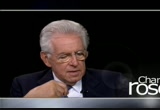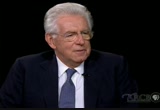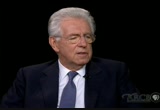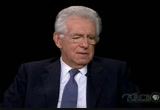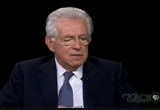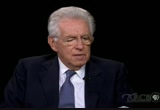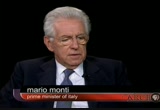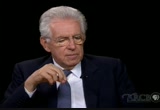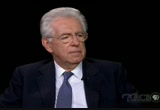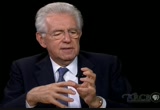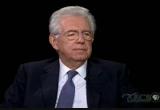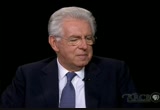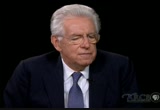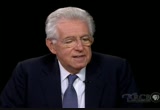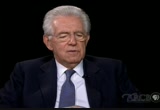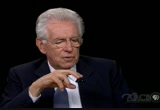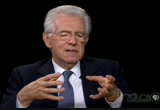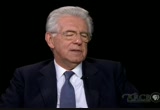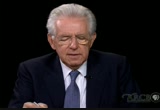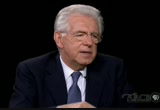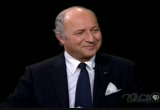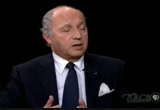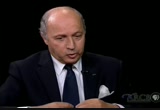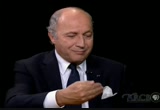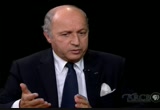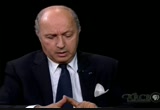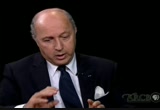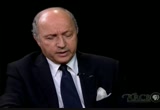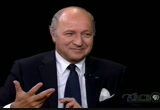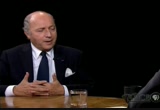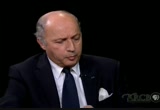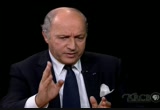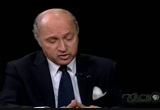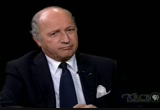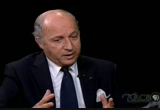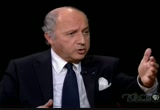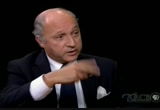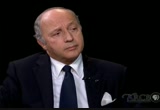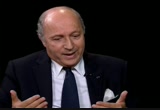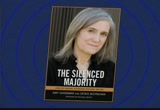tv Charlie Rose PBS September 26, 2012 11:00pm-12:00am PDT
11:00 pm
>> rose: and then the foreign miminister of france, laurent fabius. >> we have to fulfill our role, and today we do not. but if this massacre continues, i think, first, it will have terrible effects on the region. and maybe-- well, our principle, as evidence saying, is to comply with the international legal rules. but the time comes where the human pressure i too strong. and maybe the time is coming. >> rose: in order, it may be a time that you have to act, even though you cannot get security council approval? >> it could be. you know when you have such massacre, you cannot say never. >> rose: mario monti, and
11:02 pm
captioning sponsored by rose communications >> tonight a special edition of charlie rose. >> rose: mario monti is here. he is the prime minister of italy. he is also a senator for life, and until last july he was italy's minister of economy and finance. but he is not exactly a politician. as a respect economist considered be abo party politics he was chosen to form a new technocratic government.
11:03 pm
it put him at the center of the european debt crisis confronting rising interest rates that led to greece, ireland, and portugal to seek bailouts. his ability to turn calamity into opportunity has revived his nickname "super mario." i have pleased to have him here at this table for the first time. welcome. >> delighted to be here. >> rose: i see that you have said that you're not going to run for pri minister? >> no, i can confirm that i will not be a candidate. i believe i couldn't even be a candidate because, as you mentioned, i am senator for life. so candidates are candidates inn order to become members of parliament. >> rose: and you're senator for life. >> yes. >> rose: do you want to stay as prime minister? >> of course i will not. i will-- the whole government will have to resign when the
11:04 pm
elections take place, probably next-- after that, it will be for the political parties, depending on the outcome of the election, to express their wishes as to the new political configuration of italy. >> rose: in the end, because you are not a politician was good for the emergency that italy faced? >> i-- i mean, obviously, i cannot judge whether this government is doing or not the right things. b in order to do the tngs that we are doing, i think it helped not to be a politician, not to have to fight for consensus, but simply to try and have the support of the three largest political groups in the parliament, which have given us
11:05 pm
their support, in spite of not having personalies of theirs in the government. and the funny thing about it-- i say "funny" but in the end very encouraging, not so much for this government but for the country, is that italians have been submitted to probably the toughest and most intensive care ever. and they-- they're not happy of the individual measures that we hado take buthey seem to trust the government which -- >> a pretty important thing. >> yeah, which i believe confirms that, as personalliy always believed, that italians sometimes considered to be an
11:06 pm
ungovernable people, in fact have a demand for government and governance. it's the political system that often has not supplied the needed governance. ros you believe that your proudest accomplishment is that "italy is no longer risking igniting a debt crisis." >> this, obviously, would not have been the case last november when we came in, and i think it's pretty important for italy, of course, but, also, for the whole of the euro zone, the whole of europe, and the global economy that a country which is the third largest country in the-- the third largest economy in the euro zone has not added the weight to the series of
11:07 pm
local fires that have been happening. i believe that, also, the huge interest shown, for example, from this side of the atlantic, vis-a-vis italian developments can only be explained because of the risk that was attached to italy being derailed, and the hope that we have been putting italy back on the rails safely. >> rose: i would think that the most difficult thing for most governments, if you believe there was a need for austerity, to be able to make the political argument to the citizens of a country, true in greece, true in spain, true in italy. what's the argument that you believe enabled you to find the right balance? well, i don' know whether it is the right balance. i can tell you what arguments i used.
11:08 pm
very simple ones. saying we risk-- if we continue like this, that the government will not be able to pay salari salaries. the wages in the private sector would have to be sharplycut. who kws about your pensions, and so on and so forth. that was no verbal terrorism. that was the reality of what might have been around the corner. and then i tried to explain that other countries had found a way touwayout by combining fiscal austerity with some structure reforms. of course i coul't speak of
11:09 pm
structured reforms to ordinary people, but i said find-- to find new ways of giving more of a role to-- relative to cozy relationship to, give new opportunities to the outsiders in challenging existing interests in a given market to the yog, relativeo th older. and so to reduce the privileges, that's how they are in all markets and professions. so as to make the economy more vibrant and society more just. and this was a tough treatment which, by the way, i think is
11:10 pm
not over. >> rose: for italy? >> for italy, yes. >> rose: the focus today is, obviously, on spain. >> yes. >> rose: what's going to happen? >> spain is doing very deep and serious things in terms of budgetary control, and in terms of statutory reforms. i think spain is decidedly on the right path. and we'l will come out of it. and will come out ey-- i mean ce out of the risky zone. and you see italy, spain, it's impoant to look at each o our countries individually, and it is also important to see clearly that we are all part and parcel of a wider thing call the euro zone and the european union. and it's not enough-- it is
11:11 pm
imperative, but it's not enough that each of our countries puts its own house in order. we also need to have a better governance of the whole, not only of the parts. and this is happening moh teronthecau t european union as a whole is improving, is now more aware than it was one year ago, say that there are some collective problems if markets globally begin to have less confidence in the fact that the euro is there forever, will resist each storm in the financial maets. so we needed some improvements in the mechanisms through which the euro zone markets are governed. these improvements did take place with the consensus of all
11:12 pm
member states and of the european central bank in the last three, four months. the instruments are now being activated that will enable each of the country's following the right discipline to see that reflected, also, in lower interest rates, so as to have hope and continueon the right path. >> you have much more optatism today about the survival of the your own zone. >> yes, yes. >> rose: how much of is that is due to some evolution and chancellor merkel's view of things? >> you know, we are all evolving. the your heene union is a huge interaction of thought, personality, principles-- by the way, it's a fantastic place in the world to operate. and as, you see, for example, the fact that italy with a lot of effort is perceived by
11:13 pm
everybody, including germany, to be on the right track. has an influence on how jir germans-- the german public opinion, the german government see other countries in the your own zone. they become more confident on the willingness that everybody's doing its part. and it's not that there are the 5thrifty countries in the north and the lazy countries in the south. >> rose: you see a participation in that kind of dialogue. >> yes, i see participation of prejudices that had been piling up a bit too much. sometimes i still have to explain that people consider italy in the category of better
11:14 pm
countries. >> rose: yes. >> italy hasn't poro borrowed a single euro from any institution, and is the largest contributor in europe of funds and commitments to solve the situation of greece. >> rose: i wonder if there are a lot of misconceptions that you see because this is now such a public idea of the survival of the your own zone, the, venus of default by governments, and the necessity of bailouts. >> take the case of greece. cerinly there were some huge problems a few years ago with the credibility of the statistics of the greek budget and so on. but then greece is make very important efforts. they may be falling short of what was required by their agreements but still very important efforts to change and honoreddize their society.
11:15 pm
>> rose: so you're less pessimistic, if not optimistic now, about greeks, the greek survival, and not default. >>nd on top of that, i believe that it-- that greece will definitely continue to be-- stay in the your open zone. >> rose: there are many people worried about that. are you no longer wurred about that. >> i never worried, maybe wrongly. but i now believe i was right in not worrying. >> rose: i read something in reuters, i think, that you and chancellor merkel agree developments over the past week have been very positive. >> yes. >> rose: some looked the ratification of the german constitutional court. >> it said the new treaty on the european stability mechanism, which is a financial device to
11:16 pm
take care of instabilities will here and there should they occur is not violating the german constitution so it can be ratifieded by the german parlient. >> rose:o germany will be there. >> yes. and it is an important presence, of course. >> rose: germany is an important presence, of course. you can't overstate that, can you? >> we are all important in europe, and some contribute to the overall functioning of the-- let me stress, germany is important both because it is such a powerful economy and is important also because it shows theenefits that even the stronger receives from working with the others. germany is one of the countries that benefit most from the single market, from the -- >> because these other places
11:17 pm
were trading partners for them, were markets for them and they had an-- feud the economy of the exports. and there had to be somebody buying those products. >> yes, and somebody associated in a more ambitious enterprise, which is monitor stability, fiscal discipline, so the german culture, the german way of economic behavior and because it has shown to be working well in germany, is being gradually absorbed by other european countries which does not mean that more should should not be done in order to have more growth in europe. now, lance lor merkel is also more and more convinced that some collective european initiatives are welcomed in that respect. >> rose: some people be you have been part of her education.
11:18 pm
>> um... plaimaybe the combination that s place in changes-- exchanges between a person who started physics,ike mrs. merkel d the modest economies may be productive. >> rose: one of the things you pointed out to me this summer which i particularly found fascinating, there's also culture here, the culture of individual nations. >> it's almost only culture. >> rose: meaning? >> meaning that-- i mean, culture is how people behave, what-- for example, anglo-saxons, the u.k., the
11:19 pm
u.s., tend to see a bigger role for economic activities in the sense of aggressive management of demand through budgetary aggressiveness, if needed monetary policy. not so the germans, the germans are more linked to the notion-- i sometimes say for gem ans it is-- they see growth as something flowing to the benefit of those who practice virtue. virtue for a household is to engage in a lot of savings, being moderate in consumption, for a government is not to run a deficit. for a country, virtue is to have your balance of payments, if
11:20 pm
any not in deficit. now, the anglo-saxons are more accustomed to think in systemic terms what happens if each country is as virtuous as germany is? what happens to global demand then and so on and so forth? aren't these cultural aspect glz they are, indeed. >> but they determine everyday policy, if not politics. >> rose: when you look at th the-- has dealing with this crisis and having it on the front burner perhaps not ledo, you know, the end of the euro zone, as some people feared, certainly the membership in part of the euro zone, but may very well have given some momentum to monetary and fiscal and even political union?
11:21 pm
>> definitely. definitely. the man who found-- founded the concept of the european union in the late 40s and 50s, john monet. >> rose: a frchma >> said that the integration of europe will grow through crisis. and he was very right. also in that respect. because you see, when we have a serious crisis like undoubtedly the euro zone crise has been, you either accept the distraction-- this integrate ofigration, in the case of europe-- or you cope with the need to put things straight after they risk falling apart. and what is needed to have more cohesion.
11:22 pm
what is needed is each individual country and their political systems is ready to give up a bit of national sovereignty and to share that sovereignty with others-- that is, putting together a more integrated europe to be very concrete, big cause of the crisis was, of course, that some countries we nning disorderly budget deficits. now, it has been-- and this has been also the root of the greek crisis, for example-- now, to cope with this, it has been decided that each and every government now has to submit it's craft budget for the following year, not to its domestic parliament first but to the european union so that there is a check for consistency. i would say a quality control on the budgets. do they comply with the rules of the european union or not?
11:23 pm
and only after this mutual check, and the supervision of the european authorities, there i, doesthe government send its t tots parliament. you see how there is a sharing of sovereignty, which may appear to be a loss of soa of sovereigt this isn't really the case, becaussince thearke are integrated, if policies are not more integrated, then each country, even the largest countries, would have to in fact surrender their sovereignty to the marketplace. rather than keep it in the area of public powers. but then they have to share it. i am a believer in free markets, much more than italians or europeans tend to be.
11:24 pm
but i am aso deeply convinced in every orderly nrnd market economy, you have to have pretty strong public powers setting the rules and making sure that the rules are respected. and you cannot have that in a set of countries so deeply intertwined as the-- unless you have a pretty powerful and respected public power at the community level. >> rose: if in fact you have in a significant way promoted the idea, helped the idea of european integration, that becomes the signal achievement of your life? >> i have in fact devoted to european integration a lot of, ins as an economist -- >> you spent time in brussels and everything else. >> spent time in brule and works -- >> but you've probably done more
11:25 pm
for it in the last two years than ever before if in fact what happened has promoted the idea and given it impetus. i'm going to have to let you go because you have a dinner. but let me just ask you this. what are we looking at today, an unlimited bond buying program from e.c.b.? do we now have confidence that that sits there as a real anecdote to crisis? >> well, the important starting point is that it has been recognized by all european leaders that some unstable behavior in the government bond markets is not just d to in discipline in individual countries but may well be due to something wrong with the functioning of the euro zone. when that is the case, there is scope for intvention by the
11:26 pm
e.c.b. then the e.criticism b. autonomously, because it is an independent institution, made some decisions as to how it would intervene. so it would be very dangerous for countries to elude their duty to be disciplined counting on the e.c.b., in fact bail them out, but it is helpful to know that if under the supervision of the-- you are doing your job at home, then if there are vagaries in the financial markets, the e.can c.b. can be there to help. >> rose: thank you so much. back in a moment. stay with us. laurent fabius is here. he is france's foreign minister. he is in new york for the united
11:27 pm
nation general assembly. at 37 he was the youngest prime minister in the nation's history. today, he is faced with numerous foreign policy chnlz, the threat of a nuclear iran, escalating violence in syria are in focus this week. last year, france played a key role rein libya. i am please to have laurent fabius back at this table. welcome back. >> it is the same table, although a different venue. looking at libya and looking at syria, when should united nations or member states intervene? >> well, these are different situations. in libya, i think we've been right in intervening because gaddafi was a dictator, and you remember that there was a sort of libyan spring, and nobody was
11:28 pm
possible because of gaddafi. therefore, a decision was taken to intervene. >> rose: is the principle you don't intervene no matter how atroacials the acts of the government in power, if in fact they have a member of the security council who opposes? or if in fact they have an army which will make it a very bloody affair. >> no. >> rose: are those the rules? >> no. the rule is because of veto if one or two people-- nations -- permanent security members-- we cannot contribute because our principle is to intervene only if we have a legal authorization. and up to now, three times, russia and china say no. and, therefore, up to now, we haven't been able to intervene. which is a humanitarian catastrophe. because every day you have more than 200 people killed.
11:29 pm
and because the security council doesn't say yes, we can't do anything. no, it's note really true. we are actingo a humanitarian base. we are trying to lib rate areas. but the fact sthat bashar al-assad is still in power. and not only is killing people, but the risk that it will become more and more sort of sectarian conflict, and that syria itself will burst into pieces with possible side effects on lebanon, on kurdish territories, northern territory -- >> iran. everybody who neighbors syria wouldn't want to get involved. >> yes. and it's a terrible risk because it's lawyer a very touchy region. and it could become-- and it's
11:30 pm
nearly today-- sort of a religious conflict. we have to get the opposition united. until now they have been divided. we have an alternate solution. we think bashar al-assad has no future and president laurent says in the general assembly there is no room for such a regime in this assembly. and it's perfectly reasonable. but we have to build the alternative solution and it's not easy because you have different religions, different histories, you have the people who were outside -- >> what if there's atalemate and the killing continues and continues and continues. >> first it means that the rules of the security council-- when you have two countries, great yis, russia and china-- saying
11:31 pm
no, and the fact that there is a continuous killing the public tensions, you, everybody says no, it doesn't make sense. i was saying this afternoon to the security council. we are the security council of the united nations. we are not the wall counsel of not united nations. we have to fulfill our roam to implement a role but today we do not. but if this massacre continues, i think, first, it will have terrible effects on the region, and maybe-- well, our principle, as i was saying, is to comply with the international legal rules. the time comes where the human pressure is too strong, and maybe the time is coming. >> rose: in other words, there
11:32 pm
may be a time you have to act even though you cannot get security council approval. >> it could be. when you have-- well, when you have such a massacre, you cannot say never. >> rose: people during the time of the sarajevo crisis and that ceend of-- what? call genocide rnls said if you do not do something history will never forgive you. is there risk of that here? >> that's an argument. a few weeks ago i was preside over at the security council and i will i said to my colleagues, look, it's not an antidote. it's a question of history. and you a responsibility in face of history. >> rose: should, as president morsey said to me, should iran eegypt, turkey, saudi arabia, be
11:33 pm
there doing something because of a variety of reasons, that they're connected to the crisis quartet he called them. >> i think the proposal of president morrissey is interesting because these four nations have an influence on the situation. >> rose: and are engaged already in one way or the other. yes. up to now, but it's recent there have not been results but when you have to find a solution you have to discuss with everybody. therefore, france and egypt are in close links because if we can be some sort aid towards a solution, it's our role. it's our international role. we are a permanent member of the security council. we have no hidden agenda. we are there to try and help
11:34 pm
people. what do they do? what dthey want? they want to be free. they want to be free. to say, well, you have a lot of arab countries in which there has been a so-called arab spring, isn't it possible-- because, mr. bashar al-assad has decide it was not possible, no. it's the way it must go. >> rose: iran, and the nuclear issue. what do you believe iran wants? and to you believe they have made a decision on tha that? >> i hope not. first, so as nuclear energy is concerned, iran has a right to develop nuclear energy but for
11:35 pm
military use, no way, because it is too dangerous. not because it is iran but because-- if it goes that way, it means the region can be a terrible menace. therefore, no way. the question is how do you convince iran to evolve? we have-- when i saw "we" it's the big 5-- france, u.s., british, china, and russia. we're united on this issue. >> rose: the 5 plus 1 germany. >> yes, and we were sussi with iran and trying to convince them to change and we are applying sanctions. the fact is, up to now, iran has not changed. >> rose: it's not changed its behavior because of the sanctions. we have a report of the
11:36 pm
international agency they go that enfortunately, they're disrupting their program. and my own belief that what they are doing cannot be explained if ty have decided not to go nuclear. there were, we have to say, and we are saying to them, do negotiate because it's not possibly for you to have-- to go to a nuclear weapon. >> rose: in other words you said to them we need to find a negotiated way out of this because they're serious when they say containment is not a policy and you will not be allowed to have nuclear weapons. very serious. and we are decided to enforce new sanctions, because the sanctions are efficient, to a certain extent, on iran, on the
11:37 pm
iran economy. and if you want them to check, you have to use pressure and she the name of it is sanction. therefore, we are have decided to have new sanctions towards iran. >> rose: towards the financial structure of iran. you can exer the kind of pressure because they have no other ability to-- >> our system is right now they're losing more than 40 billion euros a year because of the sanction. the question also is how close are they? and you-- i think the american secretary of defense, leon panetta, has said we don't, they're there. and we think that our intelligence will tell us when theyre a year away. >> i think that makes sense.
11:38 pm
>> rose: that make sense to you. >> rose: yes. then they're a ways from having the capacity to use nuclear weapons. >> there's another element which is striking, and i don't know if you remember this one. when was it, two years ago, the russians-- we are speaking about rucha, they made a proposal. they proposed to iran that the treatment would not take place in iran but in, and before there will be a control by russia, and rawndz will get back to iran, but only in a small proportion because from this you can upon upon upouse it for -->> for med.
11:39 pm
>> and they have refused. they have refused. iran has refused. which -- >> there's also this, there is a proposal-- and i'm not sure whether it's the same or part of or simply parallel-- proposals that they would send their enriched uranium to brazil and turkey. and i'm told that's still on theitably, and the iranians have not rejected that i have to discuss that with bra zellian friend, and i'm not sure it's still on the table. >>ose:hey don't think it's on the table. the brazilians and turks were not happy when they offered to help the americans said, we're not happy with this. correct? we are now discussing these matter. we have tomorrow a meeting, thep-5 bthis issue, and we shall
11:40 pm
try and decide the next step. but we are open-- all of us want a diplomatic solution. but it is clear that iran, it's possible that they have formed-- for more reasons than nuclear weapons. >> rose: you can make an argument with respect to syria and lebanon and iran and iraq, the french ought to play a significant role because they have a history there? >> not only because of that. it is true that we know these regions. we think them very well. because we have been in these regions for a long time. and it is true that's international community acknowledges that france has a good knowledge of these countries. but it's not because of that,
11:41 pm
that we must play a role. it's because france is one of the the five nations, who is a permanent member of the security council. we have a nuclear power. we are-- if i may say so-- an infantry power. and so if we can bring something to a better world safer, it's our role. it's the reason why we are permanent members of the security council. >> rose: had to do when the sciewrs council was established. >> yes, that's true but we have to deserve our role today. >> rose: i'm not suggesting otherwise. i'm interested in this-- what role should france play in the world and how it sees its role and is there a difference between the poarn policy views.
11:42 pm
>> there are elements which are common and there are elements which are different because france remains france -- >> what does that mean? it means that to a certain intent international policy is determined by history and geography. >> rose: right. >> and it doesn't change -- >> right, right, right. >> rose: there's a difference in style i was very hutch struck that people were happy to meet him. because they considered that, you know, his taib, if i may do so. it's won't be the sort of ups and downs. president sarkozy has a lot of energies. it's a good quality. but the question is where does
11:43 pm
that energy go? but apart from that. @no, i'm joking but not really joking. but apart from that there are examples where the policies are the same as libya, no chance. >> rose: you supported that and think it was the right thing to do? there is countenance issues. for instance, black africa, we are good friend of black africa. we think that africa-- black afria is the country of the future. and we have a relationship-- i forget right now, which is not to say-- it's good for europe as well, which is a major subject for everybody. as you know, we are trying saiment to be serious in terms of public finance, and to foster
11:44 pm
dproact so as far as that is concerned, i don't think there has been a big change in our relation. europe, africa, we insist what is sustainable development. >> rose: let me stay with you for a second. you are the most quotable person in french politics. >> nobody is perfect. glie what's amazing about you and i have known you under a while and have followed your reer in and out of government as the youngest prime minister, 34 ahead of the budget, wanted to be president, fair to say? thought about running. supported dominic strauss-kahn, said some things that were not necessarily attractive of-- shall i condition-- and then all
11:45 pm
of a sunday during the campaign, you're representing-- you're going to capitalled of the world and making the case for him. >> yes. >> rose: and arranging visits? yes. i was, thinking about this story. let's take a comparison and it's maybe comparson which is a bit too ambitious. let's think about barack obama and hill we clinton, and a moment came where-- while not the best friend in the world. and fade, they're working together -- >> for four years and working together as well. >> rose: we have an excellent relationship with president obama, excellent relationship with president clinton. pomititionititions are sometimer the rude, and there have been
11:46 pm
times in the france when there was a good-- and there have been times where we have been like that. but when chosen as our candidate, we had a concern, a blind conversation. and he "me, dwowpt to work with me. and well, yes, are you our candidate and i will help you and he appointed me as minister of foreign affairs and we are looking like that. >> rose: would you have rather gone minister of finance? >> no, no. possibly 7 the only position i could take. >> rose: where goes europe, the euro zone, the european
11:47 pm
union, the ideal of idea, the political idea of peerp because awe also attracted a lot of attention because of your own battles having to do with membership in hir. >> not exactly, but six years ago, seven years ago, because of my experience as minister of finance, i became aware that the way that the euro zone and europe has chosen was not right. and that we had a lot of shifts to upright, and i bide decided to vote no on a very important occasion. and the majority of french people-- and today, i must say that probably the evolution of europe is 7 whai was
11:48 pm
forecasting. i understand that you had a conversation with mario monti. >> rose: yes. >> rose: and it true that people in europe are favoring the idea of you, but they are not satisfied with the way it is implemented and we have a lot of changes to operate so if i was grow is a concern, so far as bank supervision is concerned, and it's precisely what is take place and it's precisely what i was deacking. six years ago. the euro zone survive? >> yes. >> grease will still be in the euro zone. >> rose: provide i make mack
11:49 pm
cises. i. >> fran saw elanbelieves you have to have growth and temper austerity. >> you have to have both, a balanced budget, and to-- if you don't have growth you don't have a fiscal impediment. >> rose: will turkey become a member of europe? a member of nato but not a member of europe. >> why not? they been long term. i was speaking about meade union term, why? a., because they are not excretely repairs for that. andy know we have a lot of conditions to fulfill, and they're not filling all. and one must not forget that. they are nearly at war with cypress, can which is a number
11:50 pm
of uranium. how can you have two members of the same community refusing to recognition -- >> that's theig thing. get rid of the cypress issue. >> you have the cypress issue, which is obvious, and you have the implementation and another question. tusche is a mation i was in country, a block the country. >> rose: and an influential company. influential growth rate. >> and the discussion, when we're discussing about a new country joining the european zone, there are two conditions. a, this company doesn't want you tow-- b, is it possible for the other countries to accept. because of economic know reasons pb my answer would be for the short term, no.
11:51 pm
>> rose: ar concerned about islamicist governments or persons about croat that may be sweeping, and the question it might. it's an notab easy question. upothese are not easy questions. it belongs to people to choose their government. they're acting pretty well and we have to pay attention because you know, during years and years you have this fault possible between democracynd stability. >> rose: we chose stability, by the way.
11:52 pm
>> and he said be careful. if you want democracy, it will be a turmoil. no, we have to refuse that. to be happy when people can vote. and we have to support them, but we have to be vigilant. what what to i mean, we have to be very different about human rights bwomen's right, about the possible of alternative government, and we are supporting this government. if they're in the good direction on these issues we have to say be careful. we are not supporting you any more. the other one was -- >> the protest and security of your embassies. >> it's a gate question. the basic whawnt what this ridiculous fear and-- >> it received a portion of president obama's speech and
11:53 pm
also an interview with me, and a. in our society, the rule is freedom, liberty. it means responsibility, too. and there has been a demonstration and the task of the governments in these countries was to protect the embassies. >> rose: and those governments owe the rest of the world community the responsibility of saying to people that there are values they respect-- freedom of expression, and it does not mean the-- >> there is a sort of... support by extreme-- both sides-- extremist here, giving of most
11:54 pm
lie a complete force idea. and extremism in the other country, is giving a comeet false idea. we, the government people, have to be more subtle, more reasonable, to explain that it's not the same time but stoet and government. that freedom well, it is both significant but has drawback and it is so easy, especially with the media, to-- the dangers by many people. we have to explain to people. i think politics is about explanation. what is politics about? politics is to make people intelligent of the situations. it's not easy. >> rose: on that, thank you very much for coming.
11:55 pm
227 Views
IN COLLECTIONS
KRCB (PBS) Television Archive
Television Archive  Television Archive News Search Service
Television Archive News Search Service 
Uploaded by TV Archive on

 Live Music Archive
Live Music Archive Librivox Free Audio
Librivox Free Audio Metropolitan Museum
Metropolitan Museum Cleveland Museum of Art
Cleveland Museum of Art Internet Arcade
Internet Arcade Console Living Room
Console Living Room Books to Borrow
Books to Borrow Open Library
Open Library TV News
TV News Understanding 9/11
Understanding 9/11